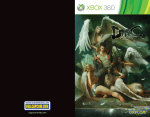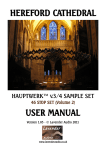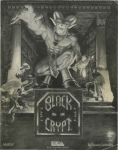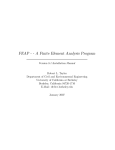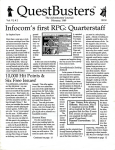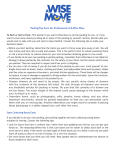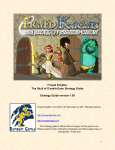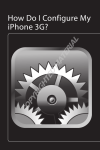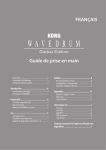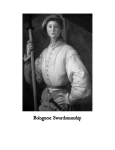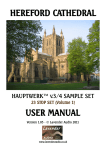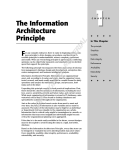Download quarterstaff-manual - Museum of Computer Adventure Game History
Transcript
USER'S MANUAL Table of Contents Foreword 3 An Overview of Gameplay 4 Starting and Stopping Proficiencies and Resistances 5 6 8 10 12 Combat 13 Manipulating Objects 15 15 16 16 17 18 19 20 21 Communicating with Quarterstaff Movement and Mapping Interacting with Other Characters Light Sources Containers Wearables Majic Sustenance Special Commands Tips for Novices Copyright and Warranty Information Quarterstaff User's Manual 2 Foreword You've grown up a man-at-arms in a large, sprawling nation in Rhea, a world where majic dictates the ways of nature, and where the longsword is the most efficient lawmaker. The prosperity of your nation and the four neighboring kingdoms has long been maintained by a peaceful network of Druidic sects. The Druids - priests who dwell and pray in groves and wooded glens - have proven themselves to be the wisest advisors and the most lucid of judges. The Druid Council, a forum for the various Druidic cults, is a powerful and benevolent body whose opinions are valued in the kingdoms throughout the land. Among the most prestigious of sects is that of the Tree Druids, who traditionally send at least one of their number to each of the five nearby kingdoms. Their advice, both political and spiritual, is always respected and depended upon. However, during the last six months, the usually-stable Tree Druids have begun to act unnaturally. Their attendance at the Druid Council has become oddly erratic, and the sect's communication with other Druidic colonies has mysteriously dwindled to nothing. The crops about the Tree colony which had always been faithfully nurtured and harvested now lay overgrown and abandoned. Sinister rumors of epidemic and disaster quickly spread through the pubs and taverns. Many an eager adventurer journeyed forth to the Tree Druid colony, buried beneath a great oak, to find out first-hand what foul fate had befallen the colony, though none returned to offer explanation. Three months ago, all traces of the sect vanished entirely. Three scouts - famed warriors named Bruno, Jaroo, and Eolene - were sent by nearby colonies to find out what had happened. Several weeks have passed without word from them, however, and once again the people of Rhea have grown restless for news of the sect. Casting about for another warrior to send, the Druid Council has called on you to journey forth and discover what unspeakable terror has destroyed the once-prosperous people. You are outfitted with weapons and provisions for one week. Now you stand before the entrance to the tunnels and caverns of the Tree Druids, ready to enter ... Quarterstaff User's Manual 3 An Overview of Gameplay A Dynamic Universe Quarterstaff represents a fresh new approach to the computer roleplaying adventure. It is a dynamic, ever-changing world in which not only you, but all living beings are given a choice in their actions. Denizens of this world all live according to real-life drives and desires, Like hunger, anger, and greed, and they actually learn from their mistakes and achievements . Some creatures may find it beneficial to join forces with you, and so, while you begin the game alone, you may quickly become the leader of a sizable party. Of course, as your party grows, you gain control over the actions of its individual members; you may wish to split up into several groups, or even to elect a new leader. The architecture of the Tree Druid complex and the nature of the objects within have also been created with realism in mind. This means that rooms aren't arbitrarily scattered about, but rather that they have been laid out with attention to purpose and design. Objects are endowed with real, physical characteristics, like weight, shape and bulk. And items weren't left about for you exclusively; all Living beings in Quarterstaff are capable of taking and using objects, so long as their intelligence is reasonable. Quarterstaff combines realism with playability and enjoyment, a union rarely found in computer gaming. It is a true simulation of a "pen and paper" fantasy role-playing game, one where every creature's habits, traits, and actions are fleshed-out and purposeful, and where every object and place obeys the laws of nature. Quarterstaff User's Manual 4 Starting and Stopping An Outtake from the Diaries of an Imaginary Adventurer I gave the signal, and the three of us broke our mounts into a canter with a few well-timed whacks of the sivatch. Turning, I paid what might be my last glance at Roke, the cozy village where I,dgro1vn up and built my reputation. The Tarkish Dragonbreath I had with lunch left me a little light-headed, a feeling which quickly translated into nostalgia as 1ve rounded a corner and lost sight of our tiny hamlet. The three of us myself, the strong and vain Maximar, and the swiftfooted elf Marawould not see our farms and families for a long while, as Jlle had decided to lay down our hoes and plo1vs and seek fortune in the Anvil Mountains, many leagues to the north. What follows is the true accoimt of our adventures inside the Mithral mines in the Upper Anvils... Setting Forth Loading the Adventure: Before you start playing Quarterstaff, you should back-up your original disks, copying all the files onto blank, formatted disks or a hard drive (strongly recommended.) Then, put your original disks in a safe place, and boot i:he back-up copy, following the instructions on your reference card. Suspending the Adventure Saving and Restoring: At any point during game play, you have the ability to save your game - that is, to make a "snapshot" of your current position in the adventure - or to restore the game to a place at which you made a save. While this feanu-e is always available, it is recommended that you use it sparingly. ~arterstaffis not a "try and die" adventure with a single, definite solution. Making a mistake or losing a battle is not a reason to restart the game, but rather a further challenge to overcome. Unless all of your characters perish, there is no need to restore a saved game, or restart altogether. For details on how to save and restore, see the reference card that was included in your game package. Throwing in the Towel Quitting: To leave Quarterstaff, save your place in the game, as described above, and then type QUIT (and hit RETURN) at any game prompt. Quarterstaff User's Manual 5 Communicating with Quarterstaff Giving Clear Orders Every turn, you will be asked to enter a command for each player in your party who is capable of action - in other words, alive, awake, and able to move about. The computer prompts you for these commands with a character's name, followed by a question mark, and preceded by an "L" b·ullet or an "F" bullet, depending upon whether that character is a Leader or a Follower (see page 11 for a discussion of Leaders and Followers.) You type your commands in plain English sentences, and hit RETURN when you're done . If the computer is unable to understand what you have typed in, either because you've used an unfamiliar word or an incomprehensible sentence, it will inform you of the problems it encountered, and ask you to reword your command. Otherwise, the game will prompt you to enter a command for the next character in your party, if there is one. Quarterstaff will recognize many different kinds of sentences. Here are some examples of sentences that the game will understand: Some Example Sentences WIELD THE BATILE AXE OPEN BOX TAKE THE GLOWING GEMSTONE EAT CRUMBS LIGHT THE BRASS LAMP WITH THE MATCH GIVE POUCH TO ZOULL STOW CRUSTY SPADE EXAMINE THE DAEMON THROW THE SHRUNKEN HEAD AT NADER UNLOCK BRASS CAGE WITHTHE PASS KEY SHOW SPARKLING ORB TO CUTPURSE LOOK AT THE ROTTING PLATFORM GIVE PRESTON THE LEOPARD SKIN Quarterstaff User's Manual 6 In some cases, you might like to do something with several objects at once. Quarterstaff allows you to use a list of direct objects, separated by commas or ANDs. Here are some examples: Referring to More than One Object at Once TAKE THE BUBBLY POTION, THE EGG AND THE SCROLL TASTE THE BEERAND THE WATER DROP EVERYTHING EXCEPT THE CLOAK INTO THE CHEST GET ALL FROM ROSEWOOD TRUNK After you tell a character to do something with multiple objects, he will perform the task on one object per turn until he is finished. (By the way, the word "he" in this past sentence and throughout the manual is meant to encompass both genders, and is not used in sexist ignorance.) Stringing Sentences Together Pronouns You may also type in several sentences in a row, if you separate them with periods. (Each sentence will still take a turn to complete.) An example: GET THE TRUNK. OPEN TRUNK. LOOK IN TRUNK In the previous example, the word TRUNK was typed three times. If you like, you may use IT, HIM or HER to refer to the object you referred to in the previous sentence. For example, to save time, you could say: GET THE TRUNK. OPEN IT. LOOK IN IT Using Adjectives to Your Advantage Quarterstaff User's Manual 7 Quarterstaff doesn't require that you type in uppercase or in lowercase, nor does it care whether you use articles, like "a" or "the," in your sentences. Also, the computer usually doesn't care whether or not you employ adjectives in your sentences. Of course, in a case where two nearby objects share the same noun, you'll need to provide an adjective to distinguish one from the other. For instance, if you're holding an English muffin, while a moldy muffin lies at your feet, saying EAT MUFFIN, without specifying which one you mean, is ambiguous. In cases where you've been vague about which of a number of similar objects you 're referring to, the computer will prompt you to specify which object you're talking about. Movement and Mapping ... Looking about, I took stock of the situation. The rough-heJVn passage JVhich JVe JVere JValking through had just emptied into a damp, mossy cave. Pools of stagnant JVater emanated a thick, putrid stench JVhich had pervaded the air for the last fifty yards of travel. A JVooden door on the JVestern JVall, partially concealed by a strange black ivy, 1vas secured by a heavy, iron lock. Maximar approached the door and reported that the lock JVas rusty and that the door looked rotted. He JVithdreJV a mace from his virtually inexhaustible arsenal of JVar-things and felled the door in three strong bloJVs. Just then came a gasp from Mara, JVho JVas studying the eastern JVall. We turned, to find that she had unearthed a secret door, 1vhich had been concealed behind some thick, lichen -covered vines. «Maximar, you stay behind in case this turns out to be a trap," I snapped. "Come on, Mara.» We opened the hidden doorway and passed through into the darkness that lay beyond ... Exploring Underground Much of the fun of Quarterstaff lies in exploring the vast architecture of the Tree Druid colony. Any character can move about independently, provided that he is a Leader. (More about Leaders and Followers will be presented on page 11.) To move a character in a particular direction, simply type in the direction you'd like him to go. You can move in any of the four cardinal directions - NORTH, SOUTH, EAST, and WEST- as well as up and down. You may abbreviate the name of a direction to its first letter (N for NORTH, for example.) Quarterstaff User's Manual 8 Passing through Doorways Secret Doors The Map Quarterstaff User's Manual 9 Throughout the complex, your way will be impeded by doors. Unlocked doors are no problem - you will automatically open them and pass through as you move. A door that is locked can always be opened with the right key. If you are unable to find the key to unlock a particular door, you might try breaking it down with a weapon. This may take a few attempts, but it often works, depending, of course, on the material of which the door is made. A word about secret doors. Some places in the Tree Druid colony have been painstakingly hidden from intruders like yourself. The entrances to such areas must be triggered to open, they cannot be opened by orthodox means. You might, for instance, move a wall hanging or pull a suspicious torch sconce in order to open a secret door. These are tactics you should try when your map contains big gaps, or when you encounter an oddly-placed dead end while exploring a passage. You can also search for secret doors by knocking on walls . A hollow sound, as opposed to a dull thump, would indicate the presence of a secret door, whose trigger you'll want to search for. Be aware that some secret doors, once opened, will close by themselves after a certain amount of time. You may wish to leave a character behind when the party enters a secret room, so that he may trigger the door to open again when they wish to return. As a character explores, the rooms he visits are automatically incorporated into his own map, provided of course that he has a light source handy. Keep an eye on the map; it provides useful information about the structure of the rooms you visit, as well as about the directions your party can go from a particular room. If ever you find that your map is no longer visible, you probably don't have a light source present. Interacting with Other Characters ... I opened the door, and stepped into a brightly-lit chamber, closely folloived by Mara . It appeared to be some sort of study, as there were twelve books lying open on a rosewood desk in the center of the room. The leather spines of the tomes were lettered in some obscure tongue, the likes ofivhich I 'd never seen. Glancing at one of the volumes, Mara remarked that the writing was in a runic language used to enchant certain majical scrolls, and that perhaps these were spellbooks or the diaries of a wizard. «Ahem!" came a rasping voice from behind us. Startled, we whirled around and came to face a slightly hunch-backed dwarf, clad in a dusty velvet cloak, who had apparently been watching us in silence for a few minutes. He introduced himself as Kaern Greeb, a caster of spells, and inquired as to oitr business. Mara turned to me and whispered that it might be of benefit for us to enlist his help in our party, and I nodded in agreement. Smiling at Kaern, I offered him a tightly-rolled scroll whose purpose we hadn't yet discovered. Mara too affected a cheerful air. Kaern examined my scroll, then looked up and thanked me, smiling also at Mara, whose attractive features had obviously not gone unnoticed. After a moment's hesitation, Kaern modestly inquired if he might be of some service to our party. Mara and I accepted his offer, and he gathered his things, ready to follow ... Building a Party The colony of the Tree Druids is fraught with evil, and you'll want to enlist whatever help you might come across while underground. Creatures in Quarterstaff are not pea-brained tack).ing dummies whose only purpose in life is to kill you. Each being has its own unique traits, and is driven by realistic desires and drives. Some may provide valuable help in return for a little food or affection; other creatures may even join forces with you when so persuaded. Some verbs that may help you in this endeavor are GIVE (TO), BRIBE (WITH), SHOW (TO), and SMILE (AT). You might also try measures to build a creature's trust, like the offering of healing services. With enough gifts and good will, many creatures will offer to join up, tl1ough some may take quite a while to make this decision. Others, however, won't join your party no matter what your characters do. This may be because of an evil nature, a wicked enchantment, or even just a bad mood. QuarterstaffUser's Manual 10 Leaders and Followers Manipulating the Party Quarterstaff User's Manual 11 When handling groups, Quarterstaff makes a distinction between two types of people: Leaders and Followers. A Leader is a character who controls his own movement, while a Follower is one who moves according to choices made by someone else. (Therefore, one can be a Leader without actually having any Followers; all your characters can be Leaders if you choose.) When you instruct a Leader to move somewhere, you won't be able to enter a command for any of his Followers. When a Leader stops to perform some non-movement action, however, you will be prompted to enter instructions for all his Followers as well. (Note that hitting RETURN at a Follower's prompt will instruct him to PASS, while typing MIMIC will cause him to do exactly what you just instructed his Leader to do. ) You'll find some commands useful in manipulating your party. Typing SPLIT at a Follower's prompt will cause him to leave his present Leader, and become a Leader himself. Typing SPLIT at a Leader's prompt will disband all of his Followers, who all become Leaders. You can also instruct someone to become a Follower of another Leader by typing JOIN, followed by the name of the Leader. Note that when a character joins another Leader, any Followers he might have automatically split from him, thus becoming Leaders themselves. Quarterstaff gives you complete control over your band of adven ~ turers. At some times, you may desire to move all your characters as one; this you can accomplish by JOINing all your characters up to one Leader. At other times, you may want your party split into a numper of sub-groups, all of whom can act independently from each other. You may wish, for instance, for sev_eral characters to rest and heal, while four others stand guard, and a third group patrols nearby rooms for signs of danger. You can even pit your own characters against each other in combat! At times the hierarchy of Leaders and Followers may become confusing, especially if your party is large . It may be helpful to remember that the "F" and "L" bullets in the prompts distinguish the two types of characters. Also, you may always type ROSTER at a character's prompt to learn who he's leading or following. Proficiencies and Resistances Improving Your Skills Resistances Most role-playing games tend to classify their characters as members of a particular character class, like "Thief'' or "Fighter," which limits their skills and abilities to the narrow set associated with their class. Quarterstaff, however, takes the view that all people have some ability, however great or small, to perform any reasonable task. By practicing any skill again and again, one will begin to master it, while unused skills will eventually worsen. Thus, characters in Quarterstaff are all rated in a wide variety of abilities, known as "proficiencies." A proficiency is a base percentage chance for a character to successfully use a particular skill. The sorts of skills that are measured range from swordsmanship to secret door and trap detection to pickpocketing ability. With practice, a character's proficiencies will develop and mature as the game progresses. Most characters are also either more resistant or more susceptible than average to certain forms of damage. Thus, most players hav~ certain "resistances" against various sources of damage, such as "falling" or "heat." These resistances are measured as multipliers . So, if a character has a x0.9 resistance against "hunger," he'll only receive 90% of the ordinary damage when he's starving. Quarterstaff User's Manual 12 Combat ... Cautiously, my three compatriots and I padded along through a thin, ivinding tunnel ivhich sloped gently down. Every so often, the flickering torchlight afforded a vieiv offaint etchings and scraivlings on the tunnel walls, which instilled a noticeable sense of uneasiness in the 1vhhle group. Morale was dropping, probably the result of our extended stay underground. I tried to think of a way to lighten the atmosphere. Quite abruptly, Maximar raised a hand and came to a stop, motioning for quiet. In the silence, we could make out the sound of footsteps around the next bend in the tunnel. Moving to either side of the passage, we drew iveapons and extinguished oitr torches. After a few moments, three creatures rounded the bend, clad in crude leather jerkins and burlap skirts - hobgoblins! · Maxi mar bounded fonvard and dealt the first blow with his twohanded sword - a slashing cut which tore at the lead hobgoblin's hip. With a yelp, he and his companions took up arms and rushed to battle. Mara had fired an arrow from a crouched position in the shadows, and now she drew her foil and moved purposefully toward one of the hobgoblins. Meanwhile, I had my hands full, fending off a series of blows from a strongly-wielded halberd. Taking the offensive, I lashed out at my foe with my longsword, striking a good blow to his chest. He recoiled in pain, and I struck him again, this time in the leg. In a rage, the hobgoblin knocked me back against the tunnel 1vall with his halberd, which took the wind from my lungs. Gasping, I thrust at him, but my sword merely glanced off his jerkin and clattered harmlessly to the floor. In a panic, I withdrew an unlit torch from my pack and swung it, clubbing the Hobgoblin in the shoulder. He shrieked, but it was clear that the source of his pain was not my hit, but a dagger which had hurtled out of nowhere, and was now lodged firmly in his neck. He turned, furious, to see Kaern whooping victoriously tiventy feet away. The hobgoblin once again moved to strike me, but his attack was cut short by a blow from Maximar 1vho had come over to help out, and he collapsed, issuing a final scream. We caught our breath for a few minutes, and then moved about searching our fallen foes for loot... Quarterstaff User's Manual 13 Sorts of Damage Melee Hurling Things at Monsters Missile Fire Quarterstaff will allow a character to attack any living creature with virtually any object at hand. Objects are broken down into a variety of general categories, depending upon what sort of damage they are capable of producing. Some items, such as swords, produce "sharp" damage; others, like clubs, do "blunt" damage. A few other common damage types are heat, cold and acid. The ability to do damage with each particular category of object is a proficiency, discussed above. Your proficiency with a certain type of weapon, "sharp" for instance, is the percentage chance you have of successfully hitting a monster while wielding that type of object. Obviously, not all weapons of a particular category will produce the same amount of damage. A club and a wooden spoon might both produce "blunt" damage - and so your chance of hitting a monster would be the same regardless of which you used - but after a successful hit, the club will produce much more damage than the spoon. You may attempt to hit a monster in three basic ways : with melee, by throwing an object, and by firing a missile. Melee is the most common; it involves striking a monster with the item in your hand, or with your fists, should you be empty-handed. Be sure to be wielding a weapon before you engage in melee; common is the slow-witted player who accidentally strikes a foe with a candle, or with a key. THROWing an object at a monster is nearly as common practice as engaging a monster in melee, though it's generally not as effective. An example of such an attack would be THROW DAGGERAT CENTAUR. A quite potent form of attack is the missile atta~k . If, for example, you're lucky enough to possess a bow and arrows, you might SHOOT AN ARROW AT a monster. It's important to note that one may fire missiles or throw objects from one room to the next. If, for example, you're to the east of a room containing a giant worm, you might try to THROW ROCK AT WORM, or SHOOT A BOLT AT WORM, if you own a crossbow. Quarterstaff User's Manual 14 Manipulating Objects EXAMINE) TAKE and DROP You will come across many objects in the Tree Druid colony. Their usefulness will vary greatly in degree and form. Some things will prove invaluable in accomplishing your goal, others will bring only harm to the party. As y0u find things, you'll want to EXAMINE them; this provides valuable information about the nature of an item. You may wish to TAKE items that seem useful. This tells your character to attempt to pick up an item and place it in his pack. If later, you discover that an object is useless or harmful, you may wish to DROP it or rid yourself of it in some other way. Most objects in Q;tarterstaff obey common sense rules, so that it shouldn't be too difficult to divine the purpose or usefulness of an item . It may, however, be helpful to pay attention to the uses and fine points of three types of objects. 1. Light Sources .. .The tunnel through which we moved in silent procession must have been serviced by some sort offissure or rift, because a steady breeze blew past us as we moved. The air was noxious, as if its origin was not the sky but some strange element below ground. Every so often, the breeze picked up, which tended to blow out our torches, making progress slow and mapping almost impossible. If only we had brought along lanterns! At least my supply of matches remained dry and plentiful... The Importance of Being Well-Lit Quarterstaff User's Manual 15 Finding and maintaining a light source is very important to your party's well-being. Without light, you can't make out the important features of the rooms you visit, nor can you see or update the automatic map. You will probably find a variety of torches, lanterns and other sources of light as you explore the colony. Some are heavy, or fixed in wall-sconces and thus can't be moved, others are lying about, and can be picked up and used. Each light source has a specific life-span, and some can be extinguished all too easily. For instance, don't expect a torch to remain lit when relegated to the bottom of your pack, or when subjected to heavy wind. Above all, it's important to keep a pack of matches about, should you need to light, or re-light, a lamp or torch. Things inside Things The Pack 2. Containers Some objects, such as pouches, chests and quivers, are capable of holding things. Most must be OPENed before they can be used, and all have maximum weight and bulk allowances. Don't hope to put gold bars into a paper bag without it ripping, or to put a spear into a foot locker. Use containers to hold and organize the many small things that you'll pick up and want to keep, like potions, scrolls, foodstuffs, and rings. Although it doesn't show up in a character's inventory, each character has a pack, in which he keeps all of his possessions, save the one currently in his hand. Like other containers, this pack has a maximum bulk and weight allowance. In other ways, however, the pack behaves quite differently from other containers. Things are automatically placed in the pack when a character picks them up, unless you specifically tell him to HOLD or WIELD that object. To put the item that one is holding into the pack, he can STOW that item, or HOLD or WIELD another object. Some containers, such as closets or cages, are big enough to hold a person. These may be ENTERed and EXITed by members of your party. If you have trouble squeezing inside, try putting down a few of your bulkier possessions. 3. Wearables ... After doing battle with a parry ofgnolls, we were able to salvage a quite usable set of chain mail from one of the dead creatures. Of course, it wouldn't fit me, Maximar or Mara, but Kaern found that he could squeeze into it quite snugly ... Many items in Quarterstaff must be worn in order to be useful. Among these items are articles of clothing, armor, jewelry and majic rings. For a character to use these items, he must WEAR them, and he may REMOVE them ifhe wants to drop them, stow them, or put them away. Quarterstaff User's Manual 16 Majic ... «oh ivell, ,, I said, and read the scroll aloud. There iv as an explosive flash of bright light, and I felt like my heart ivere being 1vrenched from my chest and stuffed in my mouth. The next I kneiv, I ivas standing dazed in a strange room. Its marble iv alls bore gently flickering torches in seances, and from their light I could make out a ghastly, emaciated dog limping toivard me, slavering from ivory fangs. I began to look around for my friends, but they ivere noivhere to be seen ... Majica! Artifacts Invisibility Quarterstaff User's Manual 17 Whereas logic and science rule our world, the world of Quarterstaff is governed by the ways of Majic. In general, the most powerful items you will find are those objects which have been crafted by enchanters and alchemists. It's always difficult to determine the exact nature of a majic artifact, except by experimenting with it, prepared to face whatever effects result, be they good or bad. Potions are imbibed, scrolls are read, and rings are worn. A wand is fired at a target by typing a majic keyword followed by the name of the target (ie: VARTIX BLOODWORM) . Most majic items are reusable, so that you needn't fear expending an object's enchantment all at once . Usually, potions have enough liquid for five or six sips, most wands have enough "charges" to fire several times, and rings can be worn for many turns without wearing out. Keep good tabs on the powers linked to each majic item; accidents can easily become disasters where majic is concerned. Just as objects can be enchanted, so can traps, doors and rooms . Be wary of the existence of majical devices which lock, hide, or booby-trap portals and chambers. Also, certain objects and creatures may have majically been rendered "invisible." An often misunderstood concept, invisibility is never absolute; items exist which aid a player in seeing the invisible. Furthermore, beings of heightened awareness can often detect the invisible by noticing the slight outline of wavy, bending light which typically surrounds an "unseen" object. Each character has a different chance of detecting this outline. Thus invisibility is at best a flawed, imperfect science. Sustenance ... We found a safe-looking cul-de-sac, and decided to set up camp. I spread out my blanket, withdrew some jerky and stale bread from my sack of rations, and sat down togna1v at my dinner. Maximar passed around a flask of ale, which 1ven.t down well after a long afternoon. Once our appetites were sated, I elected Kaern for first watch, and curled up to rest. I soon found that I was unable to sleep, after a nerve-wracking day of exploring and fighting. Begrudgingly, I took a sip from my sleep potion, and soon dozed off .. Nourishment Keeping Well-Rested and Fit Like ordinary folk, adventurers in Quarterstaff require the essentials of survival: food, drink and rest. Scattered about the complex of the Tree Druids are a variety of foods and drinkables. Some may appeal to the palate of the adventurer, others may not. Often times, the carcass of a fallen foe will provide good nourishment for the party. A wounded and weary party may expect to regain full vigor from a good night's rest. Characters may rest wherever they like; however some situations are safer than others. Small enclosed rooms, like closets, provide a good place to hide and rest. If safety is nowhere to be found, a party might want to organize shifts which allow some to rest while others maintain vigil. Characters who sleep uninterrupted will doze for about fifty rounds. If, however, a character should somehow be prematurely awakened, no health is restored, and a full night's rest is once again needed in order to restore vigor. Characters who go too long without sleep, food or drink will take a few points of damage every few turns until they attend to these bodily requirements. Quarterstaff User's Manual 18 Special Commands This is a list of useful command words which can be typed at any character's prompt. BRIEF - This instructs the computer to display brief descriptions of each room when you enter them for the first time. Brief descriptions only provide essential information about the exits and objects within a room. In order to once again receive full descriptions, type VERBOSE. GUARD -This tells the computer that your character wants to wait indefinitely, until he is interrupted by any event (getting hungry, being attacked, hearing another creature moving about nearby, etc.) INVENTORY - Typing INVENTORY will evoke a list of possessions which the character is carrying. You may abbreviate INVENTORY to I. LOOK - The computer will provide a complete description of the room you're in, and list all the objects and creatures nearby. You can type L to abbreviate the LOOK command, if you prefer. You may also use LOOK as the verb in a sentence, such as LOOK IN THE SACK. MIMIC - This tells a Follower to do exactly what his Leader is doing. OOPS - If you accidentally misspell a noun in your command sentence, and the computer replies that it doesn't recognize the word, you can correct your mistake at the next prompt by typing in OOPS followed by the correct word . For example, if you typed EAT THE BRNOWIE, and were told "The noun BRNOWIE is unknown," you could type OOPS BROWNIE at the next prompt, instead of retyping the whole sentence. PASS - This tells a character to wait for a turn. REPEAT - This tells a character that you'd like him to repeat his previous action. For example, if you command Titus to SMILE AT THE GRUMPY WIGHT, and then tell him to REPEAT on the following turn, he'll smile at the wight a second time. RESTORE - This command allows you to revert the game to the state it was at when you used the SAVE command. For specific instructions, see the reference card, which is included in your game package. ROSTER - Typing this at a character's prompt will list all the character's Followers if he is a Leader, or will list the character's Leader ifhe is a Follower. Quarterstaff User's Manual 19 SAVE - This allows you to save your adventure to a storage disk, so that you can continue game play at a later time from exactly where you left off. For specific instructions, see the reference card, which is included in your game package. SUPERBRIEF - This instructs the computer to display only the names of the rooms you enter, leaving out even essential information. To once again receive lengthier descriptions of the places you visit, type VERBOSE or BRIEF (see their descriptions above and below.) VERBOSE - This tells the computer to display rich, full descriptions of locations when you enter them for the first time. In verbose mode, the game will also describe in detail an object you pick up, unless you've already seen its description. This is the mode in which Quarterstaffstarts, and you can switch modes by typing BRIEF or SUPERB RIEF (see their explanations above.) Tips for Novices a) Quarterstajffeatures an extensive on-line help section. If you're stuck, you 'II want to make use of this, as frustration rarely breeds insight. Instructions for getting hints are given in the reference card which was included in your game manual. b) Pay attention to all the descriptions and signals the game gives you. Each time you enter a room, study the details of the room, as they may provide valuable clues. Sounds and graphics, when they appear, may also relate important information about your environment or an object you're holding. c) Be sparing about the objects you pick up. EXAMINE things you find and try to take only those which seem helpful. You can almost always go back for knickknacks you've left behind, but running out of food or light because your party is a walking treasure vault could prove deadly. d) Maintaining a source oflight is of the utmost importance to your success in the game. Keep matches handy to relight a blown-out torch, and extinguish your light sources while you rest in order to conserve them. e) Make friends wherever possible. Remember, killing someone provides immediate wealth, but befriending someone may pay greater dividends later. f) Once you've built a group, use it wdl. Use people to help each other, to carry each other's things, and to work toward common goals. Quarterstaff User's Manual 20 We're Never Satisfied Here at Infocom, were constantly trying to "push back the envelope" and explore the possibilities of this fledgling medium. Your input is important. If you liked or disliked the adventure, or some section of it, or if you found a bug, or if you think a certain puzzle was too hard or too easy, or if you have some other suggestion, drop us a note! We love every excuse to stop working, and a letter from you is just such an excuse! Write to: Copyright and Warranty Information Limited Warranty This software product and the attached instructional materials arc sold "AS 15 \,., without warranty as to their pcrtOrmance . The entire risk as to the quality and performance of the computer software program is assumed by the user. However, to the original purchaser of a disk prepared by Infocom and carrying the Infocom label on the disk jacket, Tnfixom, Inc. warrants the medium on which the progr.im is recorded to be free from defects in materials and fau lty workmanship under normal use and service fo r a period of ninety (90) days from the date of purchase . If during this period a defect on the medium should occur, the medium may be returned to Infocom , Inc. or to an authorized Infocom, Inc. dealer, and Infocom , Inc. will replace the medium without charge to you. Your sole and exclusive remedy in the event of a defect is expressly limited to replacement of the medium as provided above. This warranty gives you specific legal rights and you may also have other rig hts which vary from state to state. Infocom, Inc. 125 CambridgePark Drive Cambridge, MA 02140 Attn: Eolene If You Have Technical Problems You can call the lnfocom Technical Support Team to report "bugs" and technical problems, but not for hints to solve puzzles, at (617) 576-3190. If your game develops a problem within ninety (90) days after purchase, we will replace it at no charge. Otherwise, there is a replacement fee of $5 (U.S. currency ). Please return your registration card to register yourself as a proud owner of an Infocom role-playing game, and to receive our newsletter,. The Status Line. Credits Programming: Scott Schmitz and Ken Updike Producer: Christopher Erhardt Text: Scott Schmitz and Amy Briggs Art: Mike Novae and Don Woo Title Song: Russel Lieblich THE ABOVE WARRANTIES FOR GOODS ARE IN LIEU OF ALL WARRANTIES, EXPRESS, IMPLIED, OR STATUTORY, IN CLUDING, BUT NOT LIMITED TO, ANY IMPLIED WARRAN TIES OF MERCHANTABILITY AND FITNESS FORA PARTICULAR PURPOSE AND OF ANY OTHER WARRANTY OBLIGATION ON THE PART 01' INl'OCO M, INC. SO ME STATES DO NOT ALLOW LIMITATIONS ON HOW LONG AN IMPLIED WARRANTY LASTS, SO THE ABOVE LIMITATION MAY NOT APPLY TO YOU . IN NO EVENT SHALL IN l'OCOM, INC . OR ANYONE ELSE WHO HAS BEEN INVOLVED IN THE CREATION AND PRODUCTION OF THIS COMPUTER SOFTWARE PROGRAM BE LIABLE !:'OR INDIRECT, SPECIAL, OR CONSEQUENTIAL DAMAGES, SUCH AS, BUT NOT LIMITED TO, LOSS OF ANTICIPATED PROFITS OR BENEFITS RESULTING l'ROM THE USE 01' THIS PROGRAM, OR ARISING OUT Of ANY BREACH 01' THIS WARRANTY. SOME STATES DO NOT ALLOW THE EXCLUS ION OR LIMITATION OF INCIDENTAL OR CONSEQUENTIAL DAMAGES, SO THE ABOVE LIMITATION MAY NOT APPLY TO YOU. N .B. After the warranty period, a defective Infocom disk may be returned to Infocom , Inc. with a check or money order for $5.00 U.S. currency fOr replacement. Copyright The enclosed sofrwarc product is copyrighted and all rights arc reserved by Infocom, Inc. It is published exclusively by Infocom, Inc. The distribution and sale of this product are intended for the use of the original purchaser only and for use only on the computer system specified. Lawful users of this program arc hereby licensed only to read the program from its medium into memory of a compu ter solely for the purpose of executing the program. Copying (except tor one backup copy on those systems which provide for it - sec Rdcrcncc Card ), duplicating, selling, or otherwise distributi,ng this product is a violation of the law. This manual and all o ther documentation contained herein arc copyrighted and all rights reserved by Infocom , Inc. These documents may not, in whole or in part, be copied , photocopied, reproduced, translated, or reduced to any electronic medium or machine-readable fOrm without prior consent, in writing, from Infocom, Inc. Quarterstaff User 's Manual 21 Willful violations of the Copyright Law of the United States can result in civil damages of up to SS0,000 in addition to actual damages, plus criminal penalties of up to one year imprisonment and/ or Sl0,000 fine . QJ1artcrstaffand Tile Tomb of Sctmot!J are trademarks of In focom, Inc. The Status Line is a registered trademark oflnfocom, Inc. (c) 1988 Infocom, Inc. Printed in U .S.A. INFOCOM Proof of Purchase Quarterstaff G-IF1-03

























